9 dec 2015
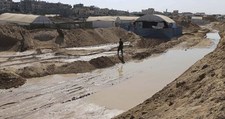
The municipal authority of the Rafah district in Gaza has refuted an Egyptian claim that the 14 Palestinian workmen who got stranded in a flooded tunnel on Tuesday were trying to infiltrate into Egypt and described it as "untrue and unfounded."
The Egyptian army flooded yesterday tunnels in the border with Gaza with seawater, which led 14 Palestinian tunnel workmen to go missing before they were located and rescued by Palestinian civil defense personnel.
"In light of the tight blockade imposed on the Gaza Strip, those workmen were trying to bring some goods and needs into the Strip through what was left of tunnels as well as to prevent the flow of water into them and to do repairs," chief of the municipal authority Subhi Radwan told Quds Press.
Subhi condemned an Egyptian security source accusing those workmen of attempting to infiltrate into Egypt through tunnels, describing his accusation as "nonsense."
"If there were a free trade zone between Egypt and Gaza, and the crossing was open to individuals and trade, the tunnels would be closed automatically and such phenomenon would have never been there in the first place. We have said this several times to the Egyptian authorities," the Palestinian official said.
The Egyptian army flooded yesterday tunnels in the border with Gaza with seawater, which led 14 Palestinian tunnel workmen to go missing before they were located and rescued by Palestinian civil defense personnel.
"In light of the tight blockade imposed on the Gaza Strip, those workmen were trying to bring some goods and needs into the Strip through what was left of tunnels as well as to prevent the flow of water into them and to do repairs," chief of the municipal authority Subhi Radwan told Quds Press.
Subhi condemned an Egyptian security source accusing those workmen of attempting to infiltrate into Egypt through tunnels, describing his accusation as "nonsense."
"If there were a free trade zone between Egypt and Gaza, and the crossing was open to individuals and trade, the tunnels would be closed automatically and such phenomenon would have never been there in the first place. We have said this several times to the Egyptian authorities," the Palestinian official said.
8 dec 2015
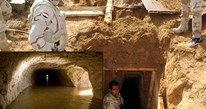
14 Palestinian tunnel workmen were reported missing on Tuesday morning after the Egyptian army flooded Rafah border areas with the Gaza Strip with seawater.
The civil defense apparatus told the Palestinian Information Center (PIC) that it started in the morning to search for the 14 missing men in the flooded tunnels and managed to locate seven of them.
A spokesman for the apparatus affirmed that the contact with the workmen was lost when the Egyptian army pumped seawater into a tunnel close to the one they were inside.
The spokesman added that there were strenuous efforts to save the lives of all stranded workmen.
Scores of Gazan workmen had been killed in similar incidents since Egypt decided to flood Gaza tunnels with seawater.
Gaza tunnels are considered a vital outline for the Palestinians in the impoverished enclave to overcome the harsh humanitarian and economic conditions they are living in as a result of the tight blockade imposed on them by Israel and Egypt.
The civil defense apparatus told the Palestinian Information Center (PIC) that it started in the morning to search for the 14 missing men in the flooded tunnels and managed to locate seven of them.
A spokesman for the apparatus affirmed that the contact with the workmen was lost when the Egyptian army pumped seawater into a tunnel close to the one they were inside.
The spokesman added that there were strenuous efforts to save the lives of all stranded workmen.
Scores of Gazan workmen had been killed in similar incidents since Egypt decided to flood Gaza tunnels with seawater.
Gaza tunnels are considered a vital outline for the Palestinians in the impoverished enclave to overcome the harsh humanitarian and economic conditions they are living in as a result of the tight blockade imposed on them by Israel and Egypt.
27 nov 2015
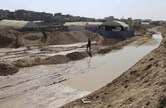
The Democratic Front for the Liberation of Palestine (DFLP) has appealed to the Egyptian authorities to stop flooding the Palestinian border areas in Rafah with seawater and to permanently open the Rafah border crossing.
Senior DFLP official Ziyad Ghargon stated on Thursday that the pumping of seawater into the Palestinian side of Rafah causes widespread damage to the aquifer, soil and homes in Gaza.
Ghargon highlighted the Palestinians' keenness on Egypt's security and stability, calling on the Egyptian leadership to turn the shared Rafah border into a zone of cooperation between the two peoples
The DFLP official pointed out to Egypt's closure of the Rafah border crossing for more than 95 consecutive days, urging the Egyptian authorities to open the crossing to Palestinian passengers permanently.
Senior DFLP official Ziyad Ghargon stated on Thursday that the pumping of seawater into the Palestinian side of Rafah causes widespread damage to the aquifer, soil and homes in Gaza.
Ghargon highlighted the Palestinians' keenness on Egypt's security and stability, calling on the Egyptian leadership to turn the shared Rafah border into a zone of cooperation between the two peoples
The DFLP official pointed out to Egypt's closure of the Rafah border crossing for more than 95 consecutive days, urging the Egyptian authorities to open the crossing to Palestinian passengers permanently.
26 nov 2015
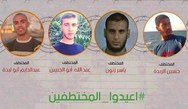
The Popular Front for the Release of four Kidnapped Palestinians in Sinai organized on Thursday a protest vigil at Rafah crossing calling for the kidnapped youths’ release after 100 days of their abduction.
The participants held photos of the four kidnapped young men along with banners stressing their right to freedom of movement.
Mohamed Abu Labda, the uncle of one of the kidnapped youths, said during the vigil that 100 days have passed since their abduction without the reveal of their sons’ whereabouts.
Egypt is responsible for their protection and safe return as they were abducted in Egyptian territory, he said.
Time has come for their safe return, he said. “If our sons made a mistake or violated the Egyptian law they must be fairly tried and not held permanently without charge or trial.”
“We sent letters more than once to the Egyptian President and PA chairman Mahmoud Abbas to immediately intervene for our sons’ release, but we received no answer.”
On August 26, armed men stopped a bus that was transferring passengers from Rafah crossing to Cairo Airport, just a short distance after the border crossing, and abducted four Palestinian youths. Since then, no information was revealed about their whereabouts.
The participants held photos of the four kidnapped young men along with banners stressing their right to freedom of movement.
Mohamed Abu Labda, the uncle of one of the kidnapped youths, said during the vigil that 100 days have passed since their abduction without the reveal of their sons’ whereabouts.
Egypt is responsible for their protection and safe return as they were abducted in Egyptian territory, he said.
Time has come for their safe return, he said. “If our sons made a mistake or violated the Egyptian law they must be fairly tried and not held permanently without charge or trial.”
“We sent letters more than once to the Egyptian President and PA chairman Mahmoud Abbas to immediately intervene for our sons’ release, but we received no answer.”
On August 26, armed men stopped a bus that was transferring passengers from Rafah crossing to Cairo Airport, just a short distance after the border crossing, and abducted four Palestinian youths. Since then, no information was revealed about their whereabouts.
25 nov 2015
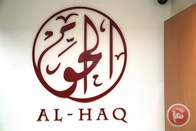
The UN Secretary-General Ban Ki-moon on Tuesday urged the Egyptian authorities to set a schedule for opening the Rafah border crossing with Gaza before the stranded Palestinians.
The UN Chief said in a report to the UN General Assembly on the latest developments in the occupied Palestinian territories that the UN’s main goal in blockaded Gaza resides in alleviating the enclave’s agony by pushing for unblocking all passageways in accordance with the United Nations Security Council Resolution 1860.
Adopted on January 8, 2009, the UNSC Resolution 1860 called for an immediate, durable and fully respected ceasefire, leading to the full withdrawal of Israeli forces from Gaza. The resolution also sets out urgent tasks for the international community and calls on United Nations member states to intensify their efforts to provide arrangements and guarantees in Gaza to sustain a durable calm and to ensure the sustained reopening of crossing points for the unimpeded provision along with the distribution throughout blockaded Gaza of humanitarian assistance, food, fuel and medical treatment,
Ban Ki-moon also expressed his grave concern at the dramatic surge in the unemployment rate in Gaza, which had hit 43% by the end of 2014.
He further warned of the fragile state of affairs in the blockaded Gaza Strip, attributing it to the exacerbated socio-economic situation, the delay in the reconstruction process, the internal security mayhem, and the restrictions on free movement.
The Rafah crossing point along the Gaza-Egypt borders is the sole passageway for some 1.9 million Palestinians.
According to official data, the Egyptian authorities have kept the Rafah crossing closed since the start of 2015, except for 19 days during which the crossing was opened for varying periods and before humanitarian cases only.
The UN Chief said in a report to the UN General Assembly on the latest developments in the occupied Palestinian territories that the UN’s main goal in blockaded Gaza resides in alleviating the enclave’s agony by pushing for unblocking all passageways in accordance with the United Nations Security Council Resolution 1860.
Adopted on January 8, 2009, the UNSC Resolution 1860 called for an immediate, durable and fully respected ceasefire, leading to the full withdrawal of Israeli forces from Gaza. The resolution also sets out urgent tasks for the international community and calls on United Nations member states to intensify their efforts to provide arrangements and guarantees in Gaza to sustain a durable calm and to ensure the sustained reopening of crossing points for the unimpeded provision along with the distribution throughout blockaded Gaza of humanitarian assistance, food, fuel and medical treatment,
Ban Ki-moon also expressed his grave concern at the dramatic surge in the unemployment rate in Gaza, which had hit 43% by the end of 2014.
He further warned of the fragile state of affairs in the blockaded Gaza Strip, attributing it to the exacerbated socio-economic situation, the delay in the reconstruction process, the internal security mayhem, and the restrictions on free movement.
The Rafah crossing point along the Gaza-Egypt borders is the sole passageway for some 1.9 million Palestinians.
According to official data, the Egyptian authorities have kept the Rafah crossing closed since the start of 2015, except for 19 days during which the crossing was opened for varying periods and before humanitarian cases only.
24 nov 2015
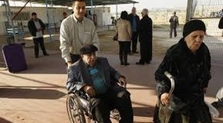
Some 3,500 patients in Gaza are eagerly awaiting the opening of Rafah crossing, on the joint borders between the Gaza Strip and Egypt, in order to travel to receive medical treatment in Arab and international hospitals, says Ministry of Health spokesperson, Ashraf Al-Qidra.
In a radio statement on Monday, Al-Qidra expressed his deep concern regarding the seriously deteriorating health conditions in the Gaza Strip, in light of the standing closure of the Rafah crossing.
According to Al Ray, Al-Qidra stated that contacts underway with the Egyptian side will not result in progress until the moment of Rafah's reopening, calling Cairo to see to this very soon.
Al-Qidra called on the International Red Cross, as well as other medical and human rights organizations, to exert pressure in opening the crossing, and to allow patients travel to receive medical treatment.
Since the beginning of this year, Rafah crossing has only been opened for 19 days, during which only a few hundred people managed to travel abroad.
In a radio statement on Monday, Al-Qidra expressed his deep concern regarding the seriously deteriorating health conditions in the Gaza Strip, in light of the standing closure of the Rafah crossing.
According to Al Ray, Al-Qidra stated that contacts underway with the Egyptian side will not result in progress until the moment of Rafah's reopening, calling Cairo to see to this very soon.
Al-Qidra called on the International Red Cross, as well as other medical and human rights organizations, to exert pressure in opening the crossing, and to allow patients travel to receive medical treatment.
Since the beginning of this year, Rafah crossing has only been opened for 19 days, during which only a few hundred people managed to travel abroad.
12 nov 2015
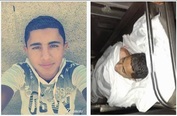
Ensan Center for Democracy and Human Rights considered the shooting attack against a 17-year-old Palestinian boy while fishing in a boat off Gaza Shores by Egyptian border soldiers as a serious attack on Palestinian sovereignty.
According to the center’s statement, the Egyptian shooting attack was a flagrant violation of the International Convention on the Rights of the Child (1989) that states any child has the right to live in peace and with dignity, and the right to be protected from any attack.
The Egyptian restrictions against the Palestinians are "illegal and immoral" practices that run contrary to the international laws, the statement added.
“Such attacks came in coincidence with the continued closure of Rafah border crossing.”
The center called on Egypt to bear its moral responsibilities towards the besieged Strip of Gaza, calling on the African Organization for Human Rights to exert pressures on Egyptian authorities for the permanent opening of Rafah crossing.
A number of Palestinian fishermen are still held in Egyptian prisons after being detained while fishing off Gaza shores. Video
According to the center’s statement, the Egyptian shooting attack was a flagrant violation of the International Convention on the Rights of the Child (1989) that states any child has the right to live in peace and with dignity, and the right to be protected from any attack.
The Egyptian restrictions against the Palestinians are "illegal and immoral" practices that run contrary to the international laws, the statement added.
“Such attacks came in coincidence with the continued closure of Rafah border crossing.”
The center called on Egypt to bear its moral responsibilities towards the besieged Strip of Gaza, calling on the African Organization for Human Rights to exert pressures on Egyptian authorities for the permanent opening of Rafah crossing.
A number of Palestinian fishermen are still held in Egyptian prisons after being detained while fishing off Gaza shores. Video
9 nov 2015
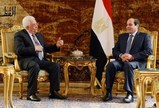
Palestinian Authority (PA) president, Mahmoud Abbas, and Egyptian president, Abdul Fattah al-Sissi, discussed in Cairo on Sunday evening the latest measures along the borders with Gaza.
Spokesperson for Egyptian presidency, Alaa Youssef, said in a statement following the meeting in Cairo that Egypt’s current measures along the border with the Gaza Strip were being carried out in full coordination with the PA leadership.
The Egyptian army recently began flooding tunnels along the borders with the blockaded Gaza Strip with seawater – a move that has resulted in the collapse of Gaza southern border areas' fauna and flora.
Youssef further claimed that such measures do not aim to harm Palestinians living in the blockaded Gaza Strip.
He added that the PA’s control and management of the border crossings in accordance with international decrees will have positive effects on Gazans’ movement out of and into Gaza.
Both parties reached an agreement on the need to stop practices that would fan the flames of simmering tension in the occupied Palestinian territories, the spokesman said.
Abbas and his counterpart further called for ceasing Israel’s illegal settlement and providing protection for the Palestinian people.
They further stressed the need to pave the way for resuming peace talks.
The Palestinian and Egyptian presidents discussed the exacerbating security and humanitarian situation in the occupied Palestinian territories and Israel’s sacrilegious schemes against holy places of worship.
Earlier, on Thursday, 16-year-old Firas Miqdad was fatally shot in his chest by the Egyptian army while fishing off the Rafah shores, in southern Gaza Strip.
Spokesperson for Egyptian presidency, Alaa Youssef, said in a statement following the meeting in Cairo that Egypt’s current measures along the border with the Gaza Strip were being carried out in full coordination with the PA leadership.
The Egyptian army recently began flooding tunnels along the borders with the blockaded Gaza Strip with seawater – a move that has resulted in the collapse of Gaza southern border areas' fauna and flora.
Youssef further claimed that such measures do not aim to harm Palestinians living in the blockaded Gaza Strip.
He added that the PA’s control and management of the border crossings in accordance with international decrees will have positive effects on Gazans’ movement out of and into Gaza.
Both parties reached an agreement on the need to stop practices that would fan the flames of simmering tension in the occupied Palestinian territories, the spokesman said.
Abbas and his counterpart further called for ceasing Israel’s illegal settlement and providing protection for the Palestinian people.
They further stressed the need to pave the way for resuming peace talks.
The Palestinian and Egyptian presidents discussed the exacerbating security and humanitarian situation in the occupied Palestinian territories and Israel’s sacrilegious schemes against holy places of worship.
Earlier, on Thursday, 16-year-old Firas Miqdad was fatally shot in his chest by the Egyptian army while fishing off the Rafah shores, in southern Gaza Strip.
8 nov 2015
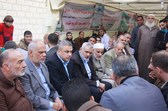
Deputy head of Hamas's political bureau Ismail Haneyya has strongly denounced the Egyptian army for killing a 17-year-old fisherman in Gaza waters and persisting in flooding the Palestinian Rafah border areas with seawater.
This came during his visit on Saturday evening to Rafah to offer his condolences to the family of the slain boy Firas Miqdad.
Haneyya condemned the killing of the boy as a "disregard for the Palestinian blood" and held the Egyptian authorities fully responsible for his death.
He also described the incident as a "violation of all values and historical ties binding the Palestinian and Egyptian peoples," affirming that Egyptian soldiers opened fire directly at fishermen in the Palestinian territorial waters.
"After we conducted an investigation, it was proven that fisherman Miqdad and the others did not cross the Palestinian waters," the Hamas official asserted.
"Let's assume that under such stifling blockade, those fishermen went some meters into the Egyptian waters, the Egyptian army, then, has the means to see clearly that the fishermen were only holding fishing gears," he added.
"Such behavior is not acceptable against the Palestinian people. We are today involved in an intifada (uprising) against the Israeli enemy and need the Arabs to support us and protect our backs," Haneyya underlined.
He also called on the Egyptian authorities to stop flooding the Palestinian border with seawater and open the Rafah crossing permanently before passengers and goods.
"Egypt can protect its security and close the tunnels, but it has to open the crossing in return."
This came during his visit on Saturday evening to Rafah to offer his condolences to the family of the slain boy Firas Miqdad.
Haneyya condemned the killing of the boy as a "disregard for the Palestinian blood" and held the Egyptian authorities fully responsible for his death.
He also described the incident as a "violation of all values and historical ties binding the Palestinian and Egyptian peoples," affirming that Egyptian soldiers opened fire directly at fishermen in the Palestinian territorial waters.
"After we conducted an investigation, it was proven that fisherman Miqdad and the others did not cross the Palestinian waters," the Hamas official asserted.
"Let's assume that under such stifling blockade, those fishermen went some meters into the Egyptian waters, the Egyptian army, then, has the means to see clearly that the fishermen were only holding fishing gears," he added.
"Such behavior is not acceptable against the Palestinian people. We are today involved in an intifada (uprising) against the Israeli enemy and need the Arabs to support us and protect our backs," Haneyya underlined.
He also called on the Egyptian authorities to stop flooding the Palestinian border with seawater and open the Rafah crossing permanently before passengers and goods.
"Egypt can protect its security and close the tunnels, but it has to open the crossing in return."
6 nov 2015

Firas Miqdad 16
The Palestinian ministry of interior affairs has called on the Egyptian security authorities to conduct an immediate investigation into the killing of a Gazan boy by Egyptian gunfire as he was fishing inside Palestinian waters on Thursday evening.
Spokesman for the ministry Iyad al-Bazam accused the Egyptian army of deliberately opening fire at Palestinian fishing boats off the Palestinian coast of Rafah and killing 16-year-old Firas Miqdad.
Bazam described the incident as a serious development and held the Egyptian security authority fully responsible for the murder of Miqdad.
"The incident is considered a grave development and a violation of our people's rights within their territory and waters," he underscored. Video
The Palestinian ministry of interior affairs has called on the Egyptian security authorities to conduct an immediate investigation into the killing of a Gazan boy by Egyptian gunfire as he was fishing inside Palestinian waters on Thursday evening.
Spokesman for the ministry Iyad al-Bazam accused the Egyptian army of deliberately opening fire at Palestinian fishing boats off the Palestinian coast of Rafah and killing 16-year-old Firas Miqdad.
Bazam described the incident as a serious development and held the Egyptian security authority fully responsible for the murder of Miqdad.
"The incident is considered a grave development and a violation of our people's rights within their territory and waters," he underscored. Video

A study released Thursday by the Department of Legal Affairs at the Palestinian Ministry of Justice warned of the serious upshots of Egypt’s flooding of Gaza borders with high-salinity water, dubbing the project a violation of international laws and conventions.
A study conducted by the Justice Ministry found out that Egypt’s pumping of seawater into the borders with the blockaded Gaza Strip leads to the destruction of the aquifer.
According to the study, the move is a flagrant violation of the UN’s resolution on the proper management of trans-boundary aquifers, the peaceful sharing of groundwater resources, and the need among States to cooperate in order to prevent pollution and the destruction of shared aquifers.
Experts, who conducted the study, warned of the menacing repercussions of the destruction of Gaza’s aquifer, saying Egypt’s attempt to protect its borders does not permit it to do harm to Palestinians.
The Justice Ministry called on all concerned parties to immediately step in and stop such a destructive project.
In what observers branded an unprecedented move set to please the Israeli occupation, the Egyptian army forces have begun to pump water from the Mediterranean Sea into underground tunnels on the southern borders of the besieged Gaza Strip since last September.
According to Gaza’s Water Authority, the move poses a serious threat to the Strip’s water and food security.
Blockaded by the Israeli regime since 2007, Gaza used to receive urgently-needed supplies through the network of underground tunnels on its border with Egypt's Sinai Peninsula.
Palestinians in Gaza are living under inhuman conditions due to the tough siege imposed by the Israeli occupation and also due to Egypt’s quasi-permanent closure of the Rafah border crossing.
A study conducted by the Justice Ministry found out that Egypt’s pumping of seawater into the borders with the blockaded Gaza Strip leads to the destruction of the aquifer.
According to the study, the move is a flagrant violation of the UN’s resolution on the proper management of trans-boundary aquifers, the peaceful sharing of groundwater resources, and the need among States to cooperate in order to prevent pollution and the destruction of shared aquifers.
Experts, who conducted the study, warned of the menacing repercussions of the destruction of Gaza’s aquifer, saying Egypt’s attempt to protect its borders does not permit it to do harm to Palestinians.
The Justice Ministry called on all concerned parties to immediately step in and stop such a destructive project.
In what observers branded an unprecedented move set to please the Israeli occupation, the Egyptian army forces have begun to pump water from the Mediterranean Sea into underground tunnels on the southern borders of the besieged Gaza Strip since last September.
According to Gaza’s Water Authority, the move poses a serious threat to the Strip’s water and food security.
Blockaded by the Israeli regime since 2007, Gaza used to receive urgently-needed supplies through the network of underground tunnels on its border with Egypt's Sinai Peninsula.
Palestinians in Gaza are living under inhuman conditions due to the tough siege imposed by the Israeli occupation and also due to Egypt’s quasi-permanent closure of the Rafah border crossing.
5 nov 2015

Firas Mikdad 16
A Palestinian minor working aboard a fishing boat was shot and killed by Egyptian army fire off the southern Gaza Strip coast of Rafah Thursday evening.
Relatives of the 16-year-old boy Firas Mikdad said that he was hit with a bullet in the chest while throwing the fishing net off the southern Rafah coat near to the Egyptian marine borders.
They said that the Egyptian army soldiers fired at Palestinian fishermen while working near the border area and one of the bullets fatally hit Mikdad. Video
Palestinian fishermen had previously been killed in similar shooting incidents at the same area over the past few years. Some of the deaths were caused by Egyptian gunboats ramming into Palestinian fishing boats and fishermen jumping into the sea to flee the shooting.
A Palestinian minor working aboard a fishing boat was shot and killed by Egyptian army fire off the southern Gaza Strip coast of Rafah Thursday evening.
Relatives of the 16-year-old boy Firas Mikdad said that he was hit with a bullet in the chest while throwing the fishing net off the southern Rafah coat near to the Egyptian marine borders.
They said that the Egyptian army soldiers fired at Palestinian fishermen while working near the border area and one of the bullets fatally hit Mikdad. Video
Palestinian fishermen had previously been killed in similar shooting incidents at the same area over the past few years. Some of the deaths were caused by Egyptian gunboats ramming into Palestinian fishing boats and fishermen jumping into the sea to flee the shooting.
4 nov 2015
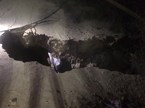
The Egyptian authorities have continued to flood the Gaza-Egypt borders with high-salinity seawater as part of intents to destroy cross-border tunnel activity, resulting in remarkable damage in Gaza’s fauna and flora.
Palestinian security forces and civil defense crews rushed to the scene to protect Palestinian civilians and children from being drowned beneath the high-salinity waters as large pools of seawater stacked one over the other in the area.
Local sources told a PIC journalist that high-salinity sea water has been leaking into the Palestinian side of the border area after the Egyptian authorities stepped up pumping of seawater into Gaza’s borders with Rafah city.
In what observers branded an unprecedented move set to please the Israeli occupation, the Egyptian army forces have begun, since September 11, to pump water from the Mediterranean Sea into underground tunnels on the southern borders of the besieged Gaza Strip, harming nearby civilian homes and cultivated land lots.
According to Gaza Water Authority, the move poses a serious threat to the Strip’s water and food security.
Blockaded by the Israeli regime since 2007, Gaza used to receive urgently-needed supplies through the network of underground tunnels on its border with Egypt's Sinai Peninsula.
Palestinians in Gaza are living under inhuman conditions due to the tough siege imposed by the Israeli occupation and also due to Egypt’s quasi-permanent closure of the Rafah border crossing.
Palestinian security forces and civil defense crews rushed to the scene to protect Palestinian civilians and children from being drowned beneath the high-salinity waters as large pools of seawater stacked one over the other in the area.
Local sources told a PIC journalist that high-salinity sea water has been leaking into the Palestinian side of the border area after the Egyptian authorities stepped up pumping of seawater into Gaza’s borders with Rafah city.
In what observers branded an unprecedented move set to please the Israeli occupation, the Egyptian army forces have begun, since September 11, to pump water from the Mediterranean Sea into underground tunnels on the southern borders of the besieged Gaza Strip, harming nearby civilian homes and cultivated land lots.
According to Gaza Water Authority, the move poses a serious threat to the Strip’s water and food security.
Blockaded by the Israeli regime since 2007, Gaza used to receive urgently-needed supplies through the network of underground tunnels on its border with Egypt's Sinai Peninsula.
Palestinians in Gaza are living under inhuman conditions due to the tough siege imposed by the Israeli occupation and also due to Egypt’s quasi-permanent closure of the Rafah border crossing.
2 nov 2015
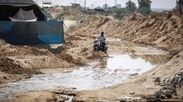
For the second time in recent weeks, Egyptian authorities flooded the area along the border with Gaza with water, to destroy underground tunnels between Sinai and the Palestinian territory.
A Palestinian source told Anadolu Agency, according to Al Ray, that many tunnels were flooded with sea water in six areas in southern Gaza.
The Egyptian army had built large pipelines along the border with the Gaza Strip and began flooding the area with seawater in September in an effort to destroy a network of underground tunnels between the Palestinian territory and the Sinai Peninsula.
Blockaded by Israel since 2007, Gaza used to receive much-needed supplies through the network of smuggling tunnels on its border with Egypt’s Sinai Peninsula.
Since the 2013 military coup against President Mohamed Morsi, Egyptian authorities have cracked down on the tunnels.
Last year, Egyptian authorities began to establish a buffer zone in North Sinai’s city of Rafah along the border with Gaza following a spate of militant attacks against army and police forces.
A Palestinian source told Anadolu Agency, according to Al Ray, that many tunnels were flooded with sea water in six areas in southern Gaza.
The Egyptian army had built large pipelines along the border with the Gaza Strip and began flooding the area with seawater in September in an effort to destroy a network of underground tunnels between the Palestinian territory and the Sinai Peninsula.
Blockaded by Israel since 2007, Gaza used to receive much-needed supplies through the network of smuggling tunnels on its border with Egypt’s Sinai Peninsula.
Since the 2013 military coup against President Mohamed Morsi, Egyptian authorities have cracked down on the tunnels.
Last year, Egyptian authorities began to establish a buffer zone in North Sinai’s city of Rafah along the border with Gaza following a spate of militant attacks against army and police forces.
